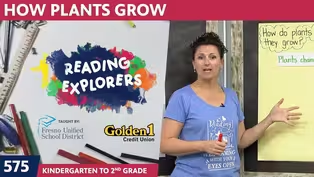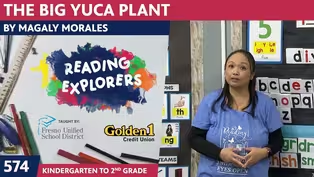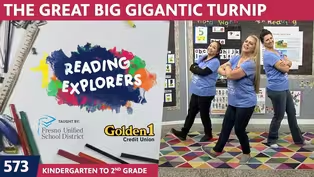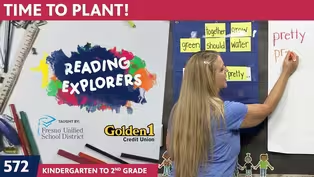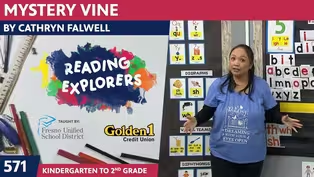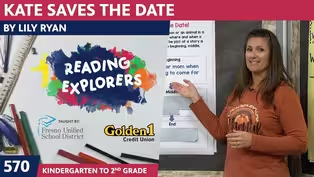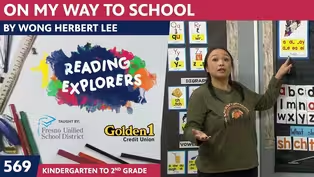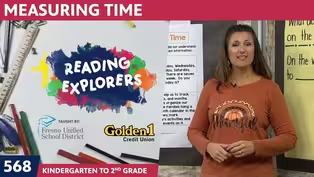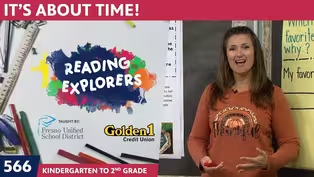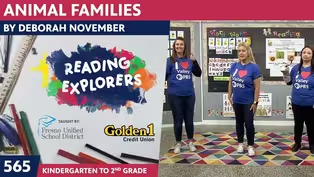
3-374: Idioms & High Frequency Words
Season 3 Episode 419 | 14m 5sVideo has Closed Captions
Join Mrs. Nix at Camp Discovery!
Third Grade teacher, Mrs. Nix, welcomes students back to Camp Discovery, a fun learning space packed with reading adventures & fun games!
Problems playing video? | Closed Captioning Feedback
Problems playing video? | Closed Captioning Feedback
Reading Explorers is a local public television program presented by Valley PBS

3-374: Idioms & High Frequency Words
Season 3 Episode 419 | 14m 5sVideo has Closed Captions
Third Grade teacher, Mrs. Nix, welcomes students back to Camp Discovery, a fun learning space packed with reading adventures & fun games!
Problems playing video? | Closed Captioning Feedback
How to Watch Reading Explorers
Reading Explorers is available to stream on pbs.org and the free PBS App, available on iPhone, Apple TV, Android TV, Android smartphones, Amazon Fire TV, Amazon Fire Tablet, Roku, Samsung Smart TV, and Vizio.
Providing Support for PBS.org
Learn Moreabout PBS online sponsorshipMore from This Collection
Valley PBS and Fresno Unified School District have partnered with Golden 1 Credit Union to create Reading Explorers Lessons for grades Pre-Kindergarten through Third grade. The daily lessons will be taught by Fresno Unified School District teachers and are created to help students practice their reading skills and reinforce lessons during distance learning.
Video has Closed Captions
Learn about the life cycle of a plant on Reading Explorers. (26m 39s)
K-2-574: The Big Yuca Plant by Magaly Morales
Video has Closed Captions
Join the Reading Explorers as we adventure into a new book The Big Yuca Plant. (26m 30s)
K-2-573: The Great Big Gigantic Turnip
Video has Closed Captions
What will happen at The Great Big Gigantic Turnip? (26m 30s)
K-2-571: Mystery Vine by Cathryn Falwell
Video has Closed Captions
The Bell has rung and the Valley PBS Classroom is open once more. (26m 32s)
K-2-570: Kate Saves The Date by Lily Ryan
Video has Closed Captions
Mrs. Nix, Mrs. Hammack and Mrs. Vang are glad to have you join her for a new day. (26m 32s)
K-2-569: On My Way To School by Wong Herbert Lee
Video has Closed Captions
Mrs. Vang is ready for a new day of phonemic awareness and reading comprehension. (26m 40s)
Video has Closed Captions
We review phonics, frequency words and more on Reading Explorers. (26m 45s)
K-2-567: Nate The Snake Is Late
Video has Closed Captions
What happens when Nate the Snake is late to school? (26m 49s)
Video has Closed Captions
It's time for school! How do you know what time it is? (26m 31s)
K-2-565: Animal Families by Deborah November
Video has Closed Captions
Welcome to the Reading Explorers lessons in the Valley PBS Classroom. (26m 14s)
K-2-564: From Caterpillar To Butterfly
Video has Closed Captions
The transformation from Caterpillar to Butterfly is a special one. (26m 52s)
Providing Support for PBS.org
Learn Moreabout PBS online sponsorship♪ Good morning to a brand new day ♪ ♪ Time to learn and games to play ♪ ♪ Learning things is so much fun ♪ ♪ Learning is good for everyone ♪ (soft music) - Good morning third graders.
I am so excited to have you here with me.
My name is Mrs. Nix and I need some help today.
I was going through, I was thinking of some things that rhyme.
We've got skate, late.
What else?
Oh, bait, that'd be a good one.
Awesome.
Thank you so much for helping me out.
I was practicing some of our puzzles that are found inside of our activity book, and I got stuck.
So thank you for helping me out today.
Would you like to have one of these awesome activity books so that you can come up with some of the words that rhyme?
It's super easy to do.
All you need to do is send me a letter to the address that's popping up at the bottom of your screen, or do you see the email address that's at the very bottom?
Send me an email, but don't forget to include your return address, and I'll put one of these books in the mail for you.
It's completely free.
All right.
In that letter, when you write it to me, it's super easy, you can decide.
Maybe you want to share something that you've been learning at school, something you've learned here on PBS, or maybe it's a book you've been reading, and you'd love to tell me the title of it so we can share it with other third graders.
Now, where are you checking out your books from?
Are you visiting the county library?
Are you visiting your school library?
Or maybe are you checking them out on the online app called Sora?
I'd love to hear that too.
All right.
Let's get started today.
We have a whole bunch of stuff planned.
I've got actually three goals for us today.
I want to go through, we're going to practice some final suffixes, or some suffixes, some final syllables, and then we're going to end our day with idioms.
Are you ready to start?
Okay, let's warm up our brains.
It sounds like Mrs. Nix needs to warm up her brain a little bit today by reading some of these high-frequency words.
Those words we come across often in our reading and writing.
I really encourage you, try taking some of these words and writing your own sentences with them.
It just makes it so that it's more fluent for you as a writer.
All right, here we go.
Let's go through, let's read them together.
Done.
Each.
Don't.
Eat.
Eight.
Down.
Even.
Draw.
Drink.
And every.
Nicely done third grade.
Let's go through, we're going to practice these two words.
So I've got draw, D-R-A-W. And even, E-V-E-N. Help me use them in a couple of sentences.
She didn't hm try to help.
Hm.
What do you like to hm?
Okay.
What do you like to even?
Oh, that doesn't make any sense.
How about, she didn't even try to help?
Oh, that makes sense.
How about this?
What do you like to draw?
Oh I'd love to hear what you love to draw.
That would be fantastic.
Maybe you could share that in your letters.
All right, let's go through and let's talk about some of these suffixes.
Now, remember, we've been talking about this all year long and especially in third grade, we're really focusing on those multi-syllabic words.
It's helpful for us as readers to know how to break apart words.
Because remember what I said, we're working on becoming amazing thinkers, readers, and writers.
So we want to think about the words that we're writing and reading about.
And by doing that, I want to talk about the suffixes, because suffixes can change a base words meaning.
And so it's important for us to understand what does that suffix really mean.
All right.
So, remember a suffix is a group of words.
They don't stand on their own.
Unlike a base word.
A base word can stand all on its own.
It has its own meaning, stands alone.
Here we go.
So let's look right here.
We've got a door.
A door can stand all on its own.
It means that we're just admiring something.
Now able means that you're able to do something, so we can add able to a door, and it becomes adorable.
Now watch this with spelling.
When a word ends with an E, most of the time we drop that E before adding our suffix.
So now we have the word adorable.
Now here's the word nerve.
Nerve.
So have you ever heard your mom say you're getting on my nerves?
I hope not.
But it does happen on occasion.
And here's having the quality of is ous.
Now this is where I'm going to change the whole meaning of my word.
Nerve is actually something that's found in your body, you have nerves.
But if you are nervous.
Again, ends with an E. We're going to drop that E before adding our suffix, and it becomes nervous.
So we've actually changed our part of speech.
And then the last suffix is Y, and it means full of.
So we have the word ice.
And so we're going to add Y and it becomes icy.
Again, ends with an E, we're going to drop that E, and then we're going to add our Y.
So we have the word ice.
So icy, it means we're full of ice.
My drink was very icy.
Was full of a lot of ice.
Okay, so just a reminder, we can change our part of speech by adding those suffixes.
Okay, so let's go through and go on to our second piece today.
And I want to talk about some syllable types.
Now we've talked about several of these in the past.
We're down here, we're talking about our consonant, plus le at the end.
So, whenever we have that final le sound in a word, we know that that's going to be our final syllable.
So that's going to help us with our spelling, with our reading.
So here are some examples.
We've got bubble, circle, castle.
We can see that that le sound is at the end.
I want to go through and I want to practice a few of these words together with you.
So when we look here, I'm training my brain to kind of identify it.
I can see the le spelling pattern.
I know that I want to include that consonant that's right before it, so I'm going to gle.
Okay, I'm practicing that with my brain.
So I can say gle.
So what's my first syllable?
E, right?
Eagle.
Two syllables.
Let's do it again.
Now we've got ble.
So we've got able.
And now we've got two syllables.
So practicing seeing these different le sounds.
So we've got dle, ble, gle.
You can train your brain to be able to see them very quickly.
It helps with sounding out of words.
Now, what might this look like in practice?
Let's go over here, and let's give it a little practice.
We've got some directions here at the top.
It says, write the word on the line and divide the syllables with a slanted line.
So let's go through.
Let's find those final syllables, training our brains, are we seeing it?
Do you see the le at the end?
So where am I going to divide it?
Don't forget to include that consonant that comes right before it.
So we've got whistle.
Okay.
That T is kind of silent, right?
We don't say whistle.
So whistle.
Okay.
How about this next one?
What do we see?
We've got the le at the end.
But don't forget, include that consonant right before.
So global.
Just like that.
Good.
Then we've got, do you see the le right there?
Motel.
It actually has an L sound.
Motel, good.
We've got le at the end.
Including that consonant.
So we've got tunnel.
Good.
See the le at the end.
Include that consonant, so what's this final sound?
Ble.
So, oh, this one's actually got multiple syllables here, so we've got ble.
But I got a couple here too.
Remember, I'm looking for my vowels.
There's going to be a vowel sound in each of my syllables.
So terrible.
So I've got two consonants right here, so I know I'm going to be able to split it right here.
Terrible.
Terrible.
Nice, it's got three.
Ooh, here's another one.
Critical.
I want you guys to practice that one at home.
Perfect.
Looking down below, we've got a couple of challenges for us today.
We're going to try and create the words using our suffixes that we just learned.
So able, ous, and the Y, okay?
So full of fury.
If I look up here, O-U-S means full of.
So my word is going to be what?
You got it.
Fury, and I want to change my Y to an I, and add O-U-S, 'cause I'm full of fury, right?
And able to be adored.
All right.
We did it earlier, it's adorable.
So ador, remember to drop that E, and add A-B-L-E at the end.
Nicely done.
Okay, here's our last part.
For today I want to talk about some figurative language, specifically idioms, and idioms are super fun.
They're that way that authors have that opportunity to create a picture inside your mind as you're reading a book, or you're reading a sentence that they've got for you.
And I have an example.
Now, couple of things I do want to point out.
An idiom is a special kind of non-literal language.
That means something different from the meaning of each word in it.
Okay, non-literal, it literally doesn't mean what it's saying.
Let's look at an example.
We're going to use some context clues to discover what it actually means.
So our life is the best life I can think of.
It takes the cake.
I know my parents made the right choice.
Okay.
So literally taking the cake is really, it's talking about a dessert, right?
So is it something for dessert?
Is that what we're talking about in this sentence?
No, it's a non literal meaning.
So when I look here, our life is the best life I can think of.
It takes the cake.
I have the best life ever.
It means that it's the best choice possible, right?
My parents made the best choices possible, and I know my parents made a right choice.
Whatever it is that we did, right?
So it is a non-literal meaning.
But when we read it, we can get really excited.
It's fantastic.
It takes the cake.
It's the best thing ever.
Okay.
I have a few other idioms that you might try using in your writing.
And I've got them written up here on this poster.
We've talked about a few of them.
I think some fun things are, like this one here, a drop in the bucket.
So if you come across or you read something where they say, oh, that's just a drop in the bucket.
You can see that it's a very small or unimportant amount in your writing.
Or how about this one?
A couch potato.
Have you ever been called a couch potato before?
Did you think that they really meant that you're a potato?
Oh my goodness.
No, it just means that someone who sits around on the table all day, maybe they watch too much TV.
Okay.
But you can include some of these really fun idioms.
Even right here, idioms are a piece of cake.
It's a way to include it.
Make your writing fun and interesting.
All right.
Hey third grade, I just want to say thanks for hanging out with me today as you're getting ready for school.
Remember, you're responsible for your learning success.
So listen, ask questions and share your ideas, because together we can do so much more.
I can't wait to see you back here at PBS tomorrow with all of your ideas, all the things that we've been practicing.
And I look forward to seeing you then.
So take care, stay safe.
I'll see you then.
Bye-bye.
♪ Good morning to a brand new day ♪ ♪ Time to learn and games to play ♪ ♪ Learning things is so much fun ♪ ♪ Learning is good for everyone ♪
Support for PBS provided by:
Reading Explorers is a local public television program presented by Valley PBS
